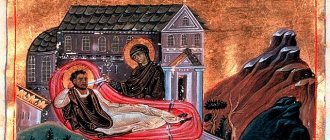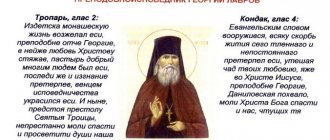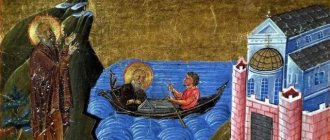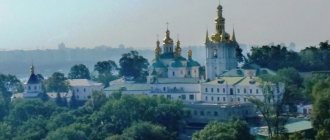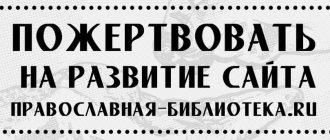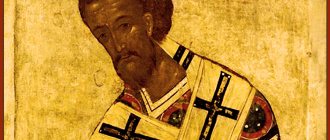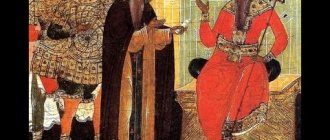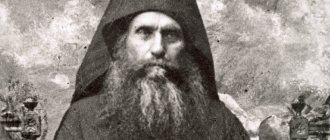Nikita of Constantinople
(c. 761 - c. 838), confessor, venerable
Memory October 13
Born in Paphlagonia around 761 [1]. His parents - probably named Gregory and Anna - gave him a good education. As a child, he was castrated so that he could become an imperial courtier and make a career in public service, because... this opportunity was given to eunuchs.
In 778, at the age of 17, he came to Constantinople and, being a relative of the future holy empress Irene, entered her service. During the reign of Saint Irene and her son Constantine, he was at their court. Thanks to his abilities, he quickly rose through the ranks. In 787, in an unknown capacity, he took part in the affairs of the VII Ecumenical Council. He was then appointed patrician, then prefect, and finally strategos of Sicily, where he succeeded as the defender of that island.
In 802, a palace coup took place that brought Nikephoros I to power, in connection with which the patrician Nikita returned to Constantinople and expressed a desire to leave worldly life and take monasticism. However, the new emperor did not allow him to leave his post in the state administration. In the spring of 807, Nikita was sent by the emperor to command the fleet in Dalmatia, in operations against the Venetians.
Towards the end of 811, after the assassination of Emperor Nikephoros, he was tonsured a monk in the Constantinople Monastery of the Mother of God Chrysonica near the Golden Gate. The tonsure was performed with the consent of Emperor Michael I Rangava, but on the condition that Nikita did not leave Constantinople.
In 815, with the beginning of the second period of iconoclasm, the iconoclast emperor Leo forced Nikita to take refuge in a rural monastery. When the iconoclast Theophilus took the imperial throne, the Monk Nikitas, for denouncing heresy in 830, was expelled from this monastery by heretics and wandered for a long time throughout Bithynia, visiting Erivolon south of Nicomedia, Pantikh, Rufiniana and, finally, the Katavol region southwest of Kios. . But from there he had to leave in order to avoid meeting with Emperor Theophilus, who had set out on a military campaign against the Arabs.
Finally, in 833, he found refuge in his native Paphlogonia, among the peasants of Katisia, where he founded a monastery in honor of the Archangel Michael. Here he ended his days.
He died at the age of 75, around 838 [2]. During his life and after his death, the monk performed many miracles.
Life
Saint Nikita was born in Paphlagonia from pious parents. He was a distant relative of Empress Theodora, wife of the iconoclast Emperor Theophilus. After training, at the age of 17, Nikita came to Constantinople. At that time, the imperial throne was occupied by the wife of the deceased Emperor Leo IV, Irina, due to the early childhood of her son Constantine. Accepted into the royal service, Nikita soon rose to the occasion, was elevated to patrician dignity and made caretaker of the entire royal palace, and then made commander of the troops in Sicily. Having reached a high position, Nikita realized all the futility and vanity of worldly titles and blessings and had a pious desire to take monastic vows. But Emperor Nikifor and his son Stavraki, appreciating Nikita’s services to the state, did not want to dismiss him from his position and let him go to a monastery. When, after them, Mikhail Rangav ascended the kingdom, Nikita asked him for permission to leave his service and take monastic vows. However, he was not allowed to leave the capital, but the emperor ordered him to be given quarters in the Golden Gate, in the so-called Chrysonicia, where he was to remain permanently. In this monastery Saint Nikita remained hopelessly until the reign of the iconoclast emperor Leo the Armenian. When Saint Nikita saw the desecration to which the holy icons were subjected to by this lawless king, he left Constantinople and joined the lower brethren of a suburban monastery and there spent time in fasting and labor. Meanwhile, the iconoclasts, having discovered that he had an icon of the Savior, which he acquired from Rome, reported this to the emperor. Officials were sent to Nikita, who with threats forced him to hand over this icon. But since Saint Nikita resolutely refused to hand her over, the messengers found one monk who pointed out where that holy icon was located. Then they entered the church and, taking the holy icon, abused it in every possible way. This blasphemy led Saint Nikita into great sorrow. Not content with this, the royal envoys, leaving the monastery, forbade him to leave there under any pretext. Subsequently, when another iconoclastic sovereign, Theophilus, ascended the royal throne, one courtier named Theodosius was sent to the monk, who, in front of all those gathered, under the threat of expulsion, demanded from him recognition of the iconoclastic Patriarch Anthony and the rejection of icon veneration. But the saint said to this:
I will never stop worshiping the icon of Christ and my God, and I will call Anthony not a patriarch, but an adulterer and a criminal... You do what you want.
For this courageous feat of faith, Saint Nikita was immediately expelled from the monastery. Having given thanks to God and taking with him three of the brethren, he went to another monastery, where he spent Great Lent and the time until Pentecost, and then left this monastery. After many wanderings and hardships, he finally settled in a seaside monastery, where he ended his life at the age of 76. Both during his life and after his death, he performed many miracles.
Congratulations to birthday people, gifts
We send congratulations to the birthday people Alexander, Alexey, Anna, Vasily, Gregory, Dmitry, Zakhar, Joseph, Sergey, as well as with the rare names Andronik, Joachim, Onufriy, Severian, Seleucus, Strator, Theodosius, Theophanes.
Saint Niketas of Constantinople, chartularius, blessed
Icon
Brief life of Blessed Nikita lived in Constantinople and held the position of chartularius (scribe). They call it “hidden” because, living in the world, among the bustle of the city, through secret deeds of piety he achieved spiritual perfection and was a great saint of God. His holy life was revealed under extraordinary circumstances. Two friends, a certain priest and deacon Sozont, quarreled. The priest died, and the deacon was very sad that they did not have time to make peace. He told the experienced elder ascetic about the sin that tormented his conscience. He gave him a letter and ordered him to give it to the first person Sozont met at midnight at the Church of Hagia Sophia of the Wisdom of God. It turned out to be Saint Nikita the Chartularius. After reading the letter, he began to cry and said that he was entrusted with something that exceeded his strength, but through the prayers of the elder who sent Sozont, he would try to fulfill it. Having made a bow in front of the church doors, Saint Nikita said: “Lord, open to us the doors of Thy mercy,” and the doors of the temple opened by themselves. Leaving the deacon on the threshold, Saint Nikita began to pray, and Sozont saw how a wonderful light shone around him. Then they left the temple and the doors closed. Approaching the Church of the Blachernae Mother of God, Saint Nikita prayed again and again the doors opened before them. It became light in the temple, and two rows of priests emerged from the altar, among whom Deacon Sozont recognized his deceased friend. Saint Nikita said quietly: “Father Presbyter, talk with your brother, and stop the enmity that you have among yourself.” Immediately the priest and deacon Sozont bowed to each other, embraced each other with love and were reconciled. The priest went back, and the doors closed by themselves. Blessed Nikita said to the deacon: “Brother Sozont, save your soul for yourself and for my benefit. Tell the Father who sent you that the purity of his holy prayers and his trust in God can raise the dead.” After these words, blessed Nikita became invisible to Sozont. Returning to his elder-confessor, the deacon thanked him with tears for the fact that, through his prayers, the great saint of God, Nikita the Chartularius, removed sin from the living and the dead.
Prayer Pray to God for me, holy servant of God Nikita, as I diligently resort to you, a quick helper and prayer book for my soul.
A gift for the birthday boy Nikita - an icon of the blessed prince Yaroslav the Wise or a handwritten icon of St. Nikita (you can choose an icon at agios-icon.ru/agios/blazhennyy_nikita_konstantinopolskiy_hartulariy/3862/?utm_term=E3862).
This and other gifts in the Agios charity online market agios-icon.ru/product/54322/54322/?utm_term=E3862
“He healed the sick and cast out demons.” Venerable Nikita the Confessor. Church calendar for April 16
The main church holidays, days of remembrance of saints and Orthodox shrines of today.
April 16 (April 3 according to the old style - church Julian calendar). Friday of the 5th week of Lent . According to the Church Charter, today at the meal dry food - uncooked Lenten food without vegetable oil (small relaxations in fasting are allowed, but it is important for churchgoers to coordinate them with their confessor). Today the memory of seven saints is being celebrated, as well as a celebration in honor of one shrine, which will be briefly described below.
* * *
Venerable Nikita the Confessor . This saint of the second half of the 8th - first quarter of the 9th centuries was from Caesarea Bithynia in Asia Minor. Immediately after birth, he lost his mother, and the pious father of the future elder took monastic vows, placing his son in the care of his grandmother, who raised the Monk Nikita in true piety and purity. From childhood, he served in the temple and was the spiritual child of the hermit Stephen, who a few years later blessed the grown-up young man to go to the Midice monastery, whose abbot was Saint Nikephoros. This is how the Life of St. Nikita describes his further history:
After seven years of virtuous life in a monastery famous for the strictness of its rules, the Monk Nikita was ordained a presbyter. The Monk Nicephorus, knowing the holy life of the young monk, entrusted him with the management of the monastery, since he himself was seriously ill. Sparing no effort, the Monk Nikita began to take care of the prosperity and improvement of the monastery. Soon the fame of the high life of the inhabitants of the monastery attracted many people seeking salvation there. A few years later the number of monks increased to one hundred people. When the Monk Nicephorus departed to the Lord, the brethren unanimously elected the Monk Nikita as abbot. The Lord honored the holy gift of miracles. Through his prayer, the deaf-mute youth regained the gift of speech; two demon-possessed women were healed; Reason returned to those deprived of reason, and many other patients were healed of their ailments.
Subsequently, the Monk Nikita suffered a lot from heretical iconoclasts. For his firm confession of the Orthodox faith, he was put in prison, where he remained for many years until the death of the wicked heretic emperor Leo the Armenian. In 824 from the Nativity of Christ, Saint Nikita departed to the Lord.
* * *
Martyrs Elpidiphoros, Diy, Bethonius and Galik . These holy sufferers accepted the crowns of martyrdom for their loyalty to Christ and His Church in the 3rd century . From their Lives we know that the martyr Elpidiphoros was beheaded with a sword, Dius was stoned, Bethonia was drowned in the sea, and Galik was given to be devoured by wild animals.
Martyr Theodosius of Tire . One of the early Christian martyrs who suffered during persecution around 307–308 AD. The holy remains of the sufferer were transferred to Constantinople, and then to Venice at a time when the Western Church had not yet moved away from Orthodoxy.
Venerable Illyricus the Wonderworker . A saint who performed monastic spiritual deeds on Mount Marcion in the Peloponnese. The life time of this Christian ascetic, as well as the details of his Life, are unknown.
Icon of the Mother of God “Unfading Color” . A miraculous image of the Most Holy Theotokos, in which the Heavenly Lady holds the Divine Infant in her right hand, and in her left hand is a white lily flower. This symbol is directly related to the Orthodox prayer chant, which contains the following words addressed to the Mother of God:
You are the Root of Virginity and the Unfading Color of Purity.
Congratulations to Orthodox Christians on the day of this shrine and on the memory of all today's saints! Through their prayers, Lord, save and have mercy on us all!
The meaning of the name Nikita
The energy of the bearer of the name lies in strength of character, balance, and patience. As a child, Nikita was distinguished by a dreamy nature, not without creative talents, inquisitive and hardworking. Very active and mobile, takes on several tasks at once.
But he quickly cools down and is again carried away by a new idea. The name Nikita is attractive to its owner and, thanks to this, has a great influence on others.
And often he becomes a leader among his comrades. But if parents spoil his character through improper upbringing, then his sympathy for him takes on an enemy tint. As an adult, Nikita achieves his goals and there are always many friends around him.
He is ambitious and at the same time loves to provide help and support to those in need. He does not like empty talk, but loves to argue, proving his point of view. His marriage is not going well, because... does not want to part with his preferences.
Literature
- Ed. “Lives”: Papachryssanthou D., “Un confesseur du second Iconoclasme: la vie du patrice Nicétas (836),” TM
, 3 (1968), 309-51.
- Acta Sanctorum
, October, vol. 3. - Butler, 6.10.
- BHG
, 1342b-1342e. - Janin R., Bibl Sanct
, 9 (1967) 892f. - Guilland, Titres
, X:597. - Janin, ÉglisesCP
, 541 - Treadgold, Byz.
Revival , 144, 147, 169, 403.
Bishop Nikita of Novgorod - Memorial Day May 13
One of the patron saints of the name is St. Nikita, who is also remembered as the recluse of Pechersk and Bishop of Novgorod. It is known about the life of the saint that he was born in Kyiv, and in his youth he was tonsured a monk at the Kiev Pechersk Monastery. Despite the abbot's warnings, Nikita became a recluse and, due to inexperience, succumbed to the temptation of the devil. He stopped praying, thinking that the devil was doing it for him, but at the same time he did not stop reading, and in his knowledge of the Old Testament he had no equal. It was only thanks to Abbot Nikon and other Kiev-Pechersk elders that the devil was driven out.
After a while, thanks to prayers, Nikita managed to achieve spiritual perfection, and in 1096 he was elevated to the rank of bishop and sent to serve in the Novgorod see. Bishop Nikita of Pechersk died in 1108. He was buried in the Cathedral of Hagia Sophia in Veliky Novgorod, and in 1558, on May 13, his incorruptible relics were found.
The name day of Nikita, whose patron is this saint, is celebrated not only on May 13, but also on February 13 and May 27. Don’t forget to congratulate a man you know named Nikita these days.
Angel Nikita Day
Every deeply religious Orthodox person considers the day of an angel much more important than the day of his birth. Because the name carries a high semantic load on its owner. And parents expecting a child need to remember this and approach this issue thoroughly.
And give your child a name according to the Orthodox calendar to give a good start in building your destiny.
Nikita's name day according to the church calendar: dates of celebration
According to the church calendar, Nikita celebrates name days on the following days:
- January - 3rd day;
- February - 13;
- March - 4;
- April - 2, 16, 17;
- May - 13, 17, 27;
- June - 2, 6, 10, 30;
- July - 4, 7;
- August - not celebrated;
- September - 22, 28;
- October - 26th;
- November - 19, 28;
- December - 30.
These days Nikita celebrates the day of the angel. As a rule, a date is chosen that is closer to the birthday, but congratulations can be accepted on any of them.
